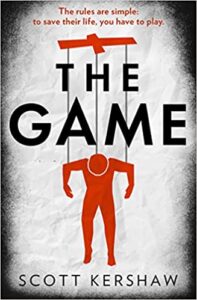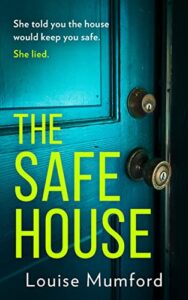This was a virtual glimpse at what these publishers have coming from their crime authors in 2022, giving the writers the opportunity to talk briefly about their new work.
It was a varied selection but in all cases the importance of character and location were emphasised – and as in all good crime novels there was a lot of talk about secrets.
The books were grouped to give an idea of their themes. First up was the category classed as jet set thrillers. I confess that this was the one that most appealed to me, being closest to what I like to read and write.
Ross Armstrong spoke about The Getaway – set on a private island in Greece where a multi millionaire and his entourage escape to the perfect sunshine holiday. Then someone dies. Scott Kershaw introduced his debut, The Game – five strangers drawn into a deadly contest that they don’t understand, to save the lives of their loved ones.
 The next category was City Crime. Getting grittier now, two police procedurals with locations with an authentic feel in London and Yorkshire. Nadine Matheson’s The Binding Room is set in Deptford. A secret room in a church heralds a story involving a serial killer. John Barlow’s Leeds set To the Grave introduces the disturbing premise of a woman who knows she will be murdered.
The next category was City Crime. Getting grittier now, two police procedurals with locations with an authentic feel in London and Yorkshire. Nadine Matheson’s The Binding Room is set in Deptford. A secret room in a church heralds a story involving a serial killer. John Barlow’s Leeds set To the Grave introduces the disturbing premise of a woman who knows she will be murdered.
For the books classed as Countryside Crime remote evocative locations were the key – isolation and unpredictable weather. In Amanda Jennings’ The Haven a self sufficient commune on Bodmin Moor appears idyllic, until things begin to unravel. Neil Lancaster’s police procedural The Blood Tide roves across Scotland from city to countryside with a story of betrayal and corruption. A debut from T Orr Munroe – who was once a CSI officer – Breakneck Point introduces a protagonist from the same profession, exiled to north Devon after exposing corruption, then encountering a serial killer that no-one else believes in.
The next category, Claustrophobic Thrillers, was definitely not for me, but it was good to see fellow Crime Cymru author Louise Mumford presenting her latest book. These stories focussed on confined settings and intense relationships. Louise’s second book The Safe House explores a reclusive mother/daughter relationship that might be one of safety or entrapment. More mothers from Helen Monks Takhar. This time, in Such a Good Mother it is the closed circle of mothers from an elite school and the new recruit who is invited to join them. Louise Hare’s Miss Aldridge Regrets takes place on a transatlantic voyage on the Queen Mary in 1936. A nightclub singer is offered the chance of a lifetime if she travels to New York. But then comes murder.
 The last category was High Concept – and these were unusual crimes. You might call them techno-thrillers. David Koepp’s Aurora is based on the Carrington Event, a geomagnetic solar storm that occurred in 1859, causing auroras in the sky and wiping out the telegraph system. Koepp’s contemporary scenario extinguishes the technology on which Earth now depends so heavily, possibly for years, and follows two characters, one prepared, one not. The latest book from Linwood Barclay Look Both Ways is perhaps the most intriguing of all the new offerings. Unlike his regular thrillers this one, which he characterised as more like a Michael Crichton, has an island community where the self driving cars have turned homicidal and are hunting.
The last category was High Concept – and these were unusual crimes. You might call them techno-thrillers. David Koepp’s Aurora is based on the Carrington Event, a geomagnetic solar storm that occurred in 1859, causing auroras in the sky and wiping out the telegraph system. Koepp’s contemporary scenario extinguishes the technology on which Earth now depends so heavily, possibly for years, and follows two characters, one prepared, one not. The latest book from Linwood Barclay Look Both Ways is perhaps the most intriguing of all the new offerings. Unlike his regular thrillers this one, which he characterised as more like a Michael Crichton, has an island community where the self driving cars have turned homicidal and are hunting.
Plenty of exciting sounding new books here for the spring and summer, whatever your taste in crime.
Evonne Wareham PhD writes romantic thrillers and a romantic comedy with a touch of crime. Her novel A Villa in Portofino was a finalist for the RNA’s Jackie Collins Award 2022.

